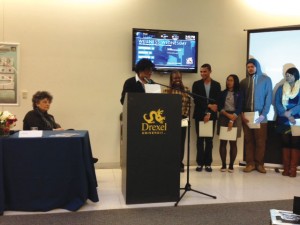A closing ceremony was held Dec. 5 in the Bossone Atrium for the 15 Drexel University students and 15 LIFT clients who completed the special topics course “Urban Life: Re-Examining the City through an Experiential Lens.”
The students came together this fall term to “explore the relationship between individuals and the city,” according to the course syllabus. LIFT clients and Drexel students were given the opportunity to engage as equal partners, meeting every Wednesday afternoon at the LIFT-Philadelphia, West Office at 56th and Chestnut streets.
The closing ceremony included student reflections on the course, presentations of final projects, and the presentation of certificates to students who completed the course.
Individual students created photo-journal projects that were put on display. The journals reflected their lifestyles in an urban environment. Collectively, the class created a 50-page social policy proposal and presented it to Philadelphia Councilwoman Jannie Blackwell, who attended the event.
Blackwell acknowledged the importance of integrating the University into the community. She promised students that she would carefully review the proposal and forward it to the appropriate staff to implement changes.
The class, which brought together community members and Drexel students, was the first of its kind to use the Inside-Out Exchange Model in a community rather than a correctional facility. Lori Pompa, founder and director of Inside-Out, originally created the model in 1997 to bring community members and higher education into prison and then create a dialogue across the differences.
Pompa explains that the most basic principle of the Inside-Out Exchange Model is “bringing two groups of people together to explore issues that are important to both of the groups, to everybody in the group, and very quickly [seeing] the two groups become one.”
Drexel professor Cynthia Rickards and LIFT Philadelphia program director Gina Gendusa took the basic principles of Inside-Out to create a class that would integrate university students into the Philadelphia community. Both LIFT clients and Drexel students received college credit for the course.
While speaking, Pompa asked students to call out adjectives that described their experience using the Inside-Out model. Students suggested the class was a “fulfilling, humbling, enlightening, inspirational, different and encouraging” experience. Third-year criminal justice major Amber Opromollo described the course as “the most enticing, academically fulfilling course” she has taken at Drexel to date.
Nathan Miller, a senior sociology major at Drexel, has studied in Inside-Out classes before. Prior to taking Rickards and Gendusa’s class, Miller took an Inside-Out class in a prison, per Pompa’s original model. He said that “the group interaction and meeting with people in the city that under any other circumstances you would not normally have met” is what makes the Inside-Out model great.
According to Miller, although Drexel is in an urban environment, it is sometimes cut off from the rest of the city. He applauded the concept of Inside-Out learning because it allows for a firsthand experience that textbooks don’t necessarily offer, where students witness applications of their studies within the community.
Patrick O’Brien, a senior studying economics, appreciated the dynamic of the Inside-Out class and noted that, “in this class, you learned the background of every individual” and valued, “being able to understand different perspectives of life in the city.”
Senior environmental studies student Augie Klipstein and junior nursing student Franchelle Little also valued the opportunity to connect with classmates and understand different styles of urban life. Klipstein noted that, “getting perspective on how different people see the world; their ethics and the way they see certain situations and how differences depend on their background” was the most valuable aspect of the course. As a Philadelphian, Little appreciated witnessing the interaction between her peers at Drexel and members of her community.
LIFT client George Armstrong, who spoke at the ceremony, said the most valuable thing he learned was about recognizing opportunity, perseverance and confidence in oneself and one’s goals. Peer and fellow LIFT client Angela Allen also spoke at the ceremony and promised to apply knowledge gained in the course as she returns to nursing school with the aid of a scholarship.
The executive director of LIFT-Philadelphia, Joshua Romalis, was pleased with the class as, “it brought people together in ways that you don’t often see.”
LIFT is a national organization dedicated to fighting poverty and providing opportunities for low-income community members. College student volunteers often work directly with community members to address immediate needs, as well as provide long-lasting knowledge that will be used as a tool to combat poverty.
Romalis added that his favorite part of working for the program is, “meeting extraordinary people every day and watching their progress as they become more engaged.”
Program director Gendusa hopes to see Drexel engaging with LIFT in the future, as well as with similar organizations to achieve a common goal of empowering people to eliminate poverty.
Drexel will continue to use the Inside-Out model in future classes. The upcoming winter term will feature “Talking the Walk,” a public speaking and civic engagement course taught by Ph.D. student Danie Greenwell. The course will be the second of its kind to deviate from the correctional facility setting that was originally introduced by Pompa.
Rose Corrigan, who also participated in the Inside-Out training, also hopes to develop a class using the model. Corrigan, a professor of political science, said she is excited for the chance to possibly teach in a correctional facility about law-related issues.
All instructors had to participate in Inside-Out training. The training was 60 hours over the span of a week in a retreat facility in Swarthmore, Pa. Numerous Drexel faculty members attended, along with other prospective instructors from across the United States and Canada.


